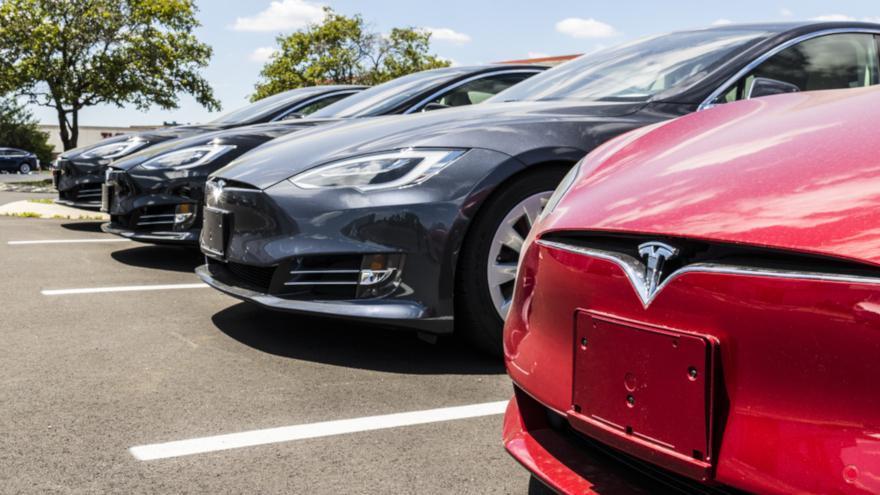Edmunds: ‘Times are tough for Tesla’

Photo credit: Jonathan Weiss/Shutterstock.com
By subscribing, you agree to receive communications from Auto Remarketing and our partners in accordance with our Privacy Policy. We may share your information with select partners and sponsors who may contact you about their products and services. You may unsubscribe at any time.
Tesla is beginning to experience what older automakers have seen happening for decades. It’s the phenomenon when the price point for a used model is quite attractive to a buyer versus a similarly equipped new one.
Let’s get into the numbers shared by Tesla as well as Cox Automotive and Edmunds.
Tesla reported on Tuesday that it delivered 443,956 vehicles and manufactured 410,831 units during the second quarter. That delivery tally is up from the Q1 figure (386,810 vehicles), while the manufacturing number is lower (433,371 units).
In Q4, Tesla said it delivered 484,507 vehicles and manufactured 494,989 units.
Cox Automotive recapped a data point that’s of particular interest to used-car managers, noting that Tesla prices plummeted from $62,269 in January 2023 to $50,099 in December 2023, a decline of 19.5%.
Considering all that data, Edmunds head of insights Jessica Caldwell offered this commentary on Tuesday.
“The decline in Tesla deliveries for Q2 doesn’t come as a big shock given that we’ve seen the automaker exhaust its bag of tricks by lowering prices and increasing incentives to spur demand without much success in the U.S. market,” Caldwell said.
Subscribe to Auto Remarketing to stay informed and stay ahead.
By subscribing, you agree to receive communications from Auto Remarketing and our partners in accordance with our Privacy Policy. We may share your information with select partners and sponsors who may contact you about their products and services. You may unsubscribe at any time.
“Times are tough for Tesla: EV sales have slowed, many EV competitors have also been generous with incentives, and the company’s haphazard price cuts and incentives have become less effective in capturing the attention of shoppers the more frequently they’re leveraged,” Caldwell continued. “In fact, these tactics are arguably more effective these days in drawing the ire of Tesla owners as they watch the residual values of their vehicles dwindle away. Similar to what we saw in the pre-COVID auto retailing world, plentiful incentives give consumers an expectation that they are always available — which has long term negative consequences for the brands that overuse them.
“Given the affordability crisis, and Tesla’s latest offering is on the pricey side, Tesla is suffering from a narrow product portfolio. The company has less room to nudge consumers into other vehicles and price points that might be more appropriate in the macro environment. Even competing with their attractively priced used counterparts is likely a challenge for new Teslas,” she went on to say.
Edmunds also shared some data connected with trade-in activity and Tesla.
According to Edmunds trade-in data from Q2, just 39% of consumers who traded in Teslas to dealerships went to a luxury brand, which is a notable decrease compared to the 51.5% from Q2 2021.
Edmunds data on Tesla Model 3 & Model Y Trade-ins
| Type of new vehicle purchased with a Model3/Y trade-in* | Q2 2022 | Q2 2023 | Q2 2024 |
| Gas | 57.2% | 48.3% | 41.9% |
| EV | 17.8% | 23.8% | 30.7% |
| Hybrid | 6.9% | 9.0% | 12.9% |
| Mild hybrid | 7.6% | 8.4% | 6.2% |
| Plug-in hybrid | 7.3% | 8.4% | 5.7% |
| Diesel | 2.7% | 1.7% | 2.0% |
(*U.S. market only; not inclusive of direct-to-consumer brands)
Source: Edmunds
“While perception of the brand has historically been a selling point for Tesla, Elon Musk’s antics and his takeover of Twitter haven’t exactly helped prop up Tesla’s image. And compounding the issue, Tesla is shifting away from being a premium brand and going more mainstream,” Caldwell said.
“The one thing that is going according to plan for Tesla is that Elon Musk’s brand appears to be spreading the EV gospel,” she added. “According to Edmunds data, fewer owners are reverting back to ICE vehicles when trading in their Teslas. In Q2 2024, 30.7% of Teslas traded in went to the purchase of another EV which is up from 17.8% two years ago.”


